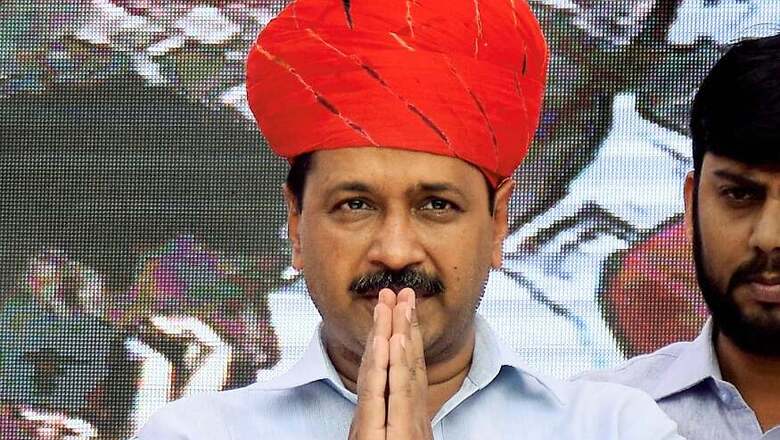
views
New Delhi: The impact of the 2019 Lok Sabha elections has been cataclysmic on political parties opposed to the BJP, particularly on Congress, which is in tatters as it struggles to keep its flock together. The party has no one voice on critical moves such as the abrogation of Articles 370 and 35A. The situation in the CPI (M) and TMC is no different and, in fact, the fiery TMC chief Mamata Banerjee has had to rope in Prashant Kishor to carve out a fresh strategy after the wake-up call.
But the after-effects of the general elections are most evident in the Aam Aadmi Party (AAP), seen once as a robust and consistent Opposition to Prime Minister Narendra Modi and the BJP. The ground beneath the party has been shaken and is threatening to slip away altogether.
An alarmed AAP, which has to face a very crucial election in Delhi in another six months, is coming to terms with its abysmal performance in Lok Sabha elections. While the poll defeat of their candidates was always a possibility, what came as a shock was the sheer margin of defeat, especially in Delhi.
As is well-known now, not only did all seven candidates of AAP lose, five even lost their deposits. In the New Delhi constituency, from where Delhi chief minister Arvind Kejriwal is an MLA, AAP stood at a poor third. In the East Delhi constituency, Atishi Marlena Singh for whom deputy chief minister Manish Sisodia had campaigned aggressively, almost putting his own reputation at stake, was also a distant number three, losing even to Congress’s Arvinder Singh Lovely.
Needless to say, the writing on the wall is clear. Losing to the BJP was one thing, but how did the party lose to the Congress? How and why did a sitting government, with 54 per cent vote share in 2015, 67 of 70 seats, ample pro-people measures and a still popular chief minister, perform so abysmally? The party’s vote share had crumbled from 33 per cent in 2014 Lok Sabha polls to just 18 per cent in 2019. Three of the seven candidates forfeited their deposit. The BJP won 57 per cent of the vote share, up by 10 per cent from its 2014 Lok Sabha performance.
For public consumption, and to keep the faith of volunteers, AAP chief has said that the 2019 election was one “to elect the PM”, where the contest was between the “big parties”, between “Narendra Modi and Rahul Gandhi”. But even here, there is an acknowledgement of the shrinking of the AAP in the political space. The AAP narrative of sending seven MPs to the Parliament to fight for Delhi’s rights , especially for full statehood or Kejriwal’s promise to support the then Congress president Rahul Gandhi in the event of a hung verdict, did not cut the ice with the voters. There was a severe erosion in its support among Muslims, Dalits and the middle class.
So it comes as no surprise now that the Delhi government is an overdrive to make the most of the last few months before elections in Delhi. For instance, Kejriwal’s major announcement of free rides for women in DTC and Delhi Metro came on June 3, just 10 days after the Lok Sabha election results.
Since then the Delhi chief minister has also announced free electricity for up to 200 units and a 50 per cent subsidy on consumption of up to 400 units —a major poll plank of the AAP. Not just that, the installation of CCTV cameras is already on and free WiFi is also on the way. Yet, there has been a perceptible shift in Kejriwal’s politics instead of being confrontational and combative he has offering a mellowed cooperation, and importantly, has perhaps moved towards the Right of the Centre politically.
The AAP chief had felt the need to force himself to change ahead of the 2019 elections. He had thrown his weight with the anti-Modi brigade — Chandrababu Naidu, Mamata Banerjee and even tried his best to stich an alliance with arch ideological opponent, the Congress party.
Lately, the most dramatic change has been his own response to Prime Minister Narendra Modi and the central government. On August 16, Kejriwal’s response to Modi greeting him on his birthday was “Thank u so much PM sir for your wishes (sic)”, a response that was dramatically different from his previous measured courtesy to the PM’s greetings.
Not long ago, the AAP nurtured ambitions of challenging Modi in his backyard. Kejriwal never minced words while taking on Modi, had campaigned in Gujarat multiple times and had memorably taken on Modi in Varanasi and emerged as the most fearless and consistent opposition to him.
The party’s open support for arch rival BJP’s recent abrogation of Articles 370 and 35A, though not entirely unexpected, took many by surprise when AAP chief announced to the world, shorn of all subtlety by tweeting, “We support the govt on its decisions on J&K. We hope this will bring peace and development in the state.”
When criticism for Kejriwal’s position mounted because he had been very vocal in his demand for full statehood for Delhi, it was left to AAP RS member Sanjay Singh to clarify that the party did not support the diminishing of J&K from a state to a UT.
“There is a softening of stance,” concedes senior journalist Neerja Choudhury, adding, “The kind of obstruction put in the way of the Delhi government was unprecedented. There was a message to the voters — if the Centre can do this, why bring in a state government (of a different party)? Any state government has to have a working relationship with the Centre, especially a powerful government, Kejriwal has to take on the state leadership, not central government.”
However, it is not support for PM Modi or BJP’s agenda all the way. One, the AAP has not supported the PM’s pet agenda of ‘One Nation, One Election’, despite a well-publicised meeting between Modi and Kejriwal, where Ayushman Bharat was discussed. Delhi has stayed away from embracing the same and the party has not supported the BJP on Triple Talaq Bill, or RTI Amendment Bill either.
There is also a perceptible attempt at reinforcing Kejriwal’s own identity as a ‘Hindu’. On June 4, 12 days after the Lok Sabha poll results, Kejriwal retweeted a picture, “Swaminarayan Bhagwan Ka Abhishek’ (Kejriwal performing Abhishek of Swaminarayan ji) and went on to retweet four more pictures tweeted by the party’s official Twitter handle. The last of the five retweeted pictures said, “AAP Convenor and Delhi CM performing abhishek of the neelkanth varni idol – the youthful and yogic form of Bhagwan Swaminarayan.”
A day before, on July 4, Kejriwal had tweeted Eid greetings in a simple and unobtrusive manner, “Aap sabhi ko eid Mubarak”, there were no pictures. Kejriwal had welcomed the court verdict in the Kathua gang-rape and murder of a minor, however, his silence on the lack of conviction of the six accused in the Pehlu Khan lynching case was too loud to go unnoticed. In the latter instance, Kejriwal did not even tweet. He delegated the same to his deputy Manish Sisodia.
The AAP government’s Teerth Yatra programmes are very well advertised. Kejriwal himself was scheduled to accompany a batch of pilgrims on July 20 but had to reschedule it for a later time due to former chief minister Sheila Dikshit’s death. The announcement of free bus rides for women came on the Independence Day, which coincided with Raksha Bandhan, and its implementation will happen on Bhai Dooj.
Analysing the shift, senior journalist Neerja Choudhury says: “The writing on the wall is very clear for 2020. Before 2019, minorities were swinging back to the Congress. That may change, may not change (in 2020). The dynamics of Delhi Assembly elections will be different. Kejriwal has to be ready to do without them. He would want more of the Hindu vote bank. There is a lot of admiration for him among the basti people because this government has delivered. The reforms in government schools have not even been attempted in any other part of the country, mohalla clinics are a great success.” But Choudhury is clear that Kejriwal has to re-craft his vote base.
Another case in point is Kejriwal government’s recent decision to introduce ‘deshbhakti curriculum’ or ‘patriotism classes’ in school. “The nationalistic feeling is there. It is a reality in India. To talk about trying to do something for your country while you are still in school is not a bad thing. Like PM Modi said, single use plastic is also patriotism. Is lynching patriotism? No. It need not be narrow patriotism or jingoism. He is catering to the public mood, the public sentiment,” Choudhury points out.
Do all these this signal a radical shift in Kejriwal’s politics? Poliical commentator Ashis Nandy, comments, “This just allows him a degree of flexibility. No one can accuse him or his government of being anti-Hindu or anti-Indian. This is to make sure people don’t mobilise against him on issues of nationalism. There is no shift in politics.”
Right from its inception, the AAP had abrogated itself to a certain degree of maneuverability and had a hard time managing ideological contradictions. If Kejriwal differed with Prashant Bhushan’s stand of Kashmir, he also differed with Kumar Vishwas’s obvious rightist position. ‘Bharat Mata Ki Jai’ was and still is a cherished slogan, the secularism of the Left was not for AAP, and Kejriwal shied away from ideological straitjackets. But perhaps this also explains why the party does not have a steady or committed vote base.
In many of his campaigns, Kejriwal had tried to convey that BJP is not a party that can claim to protect the Hindus or represent their interests. Faced with a formidable challenge from the BJP, a do-or-die battle for the party in Delhi, is Kejriwal then engaging more in what is loosely understood as ‘Hindu politics’ to challenge that very perception about the BJP and aim for a larger chunk of ‘Hindu vote’?
Nandy disagrees, “On the whole, many people are protecting themselves against this tide of the ‘nationalistic feeling’. Kejriwal is like any other people, he has a large constituency of supporters which he does not want to go away to the BJP on issue of some vague nationalism’.


















Comments
0 comment